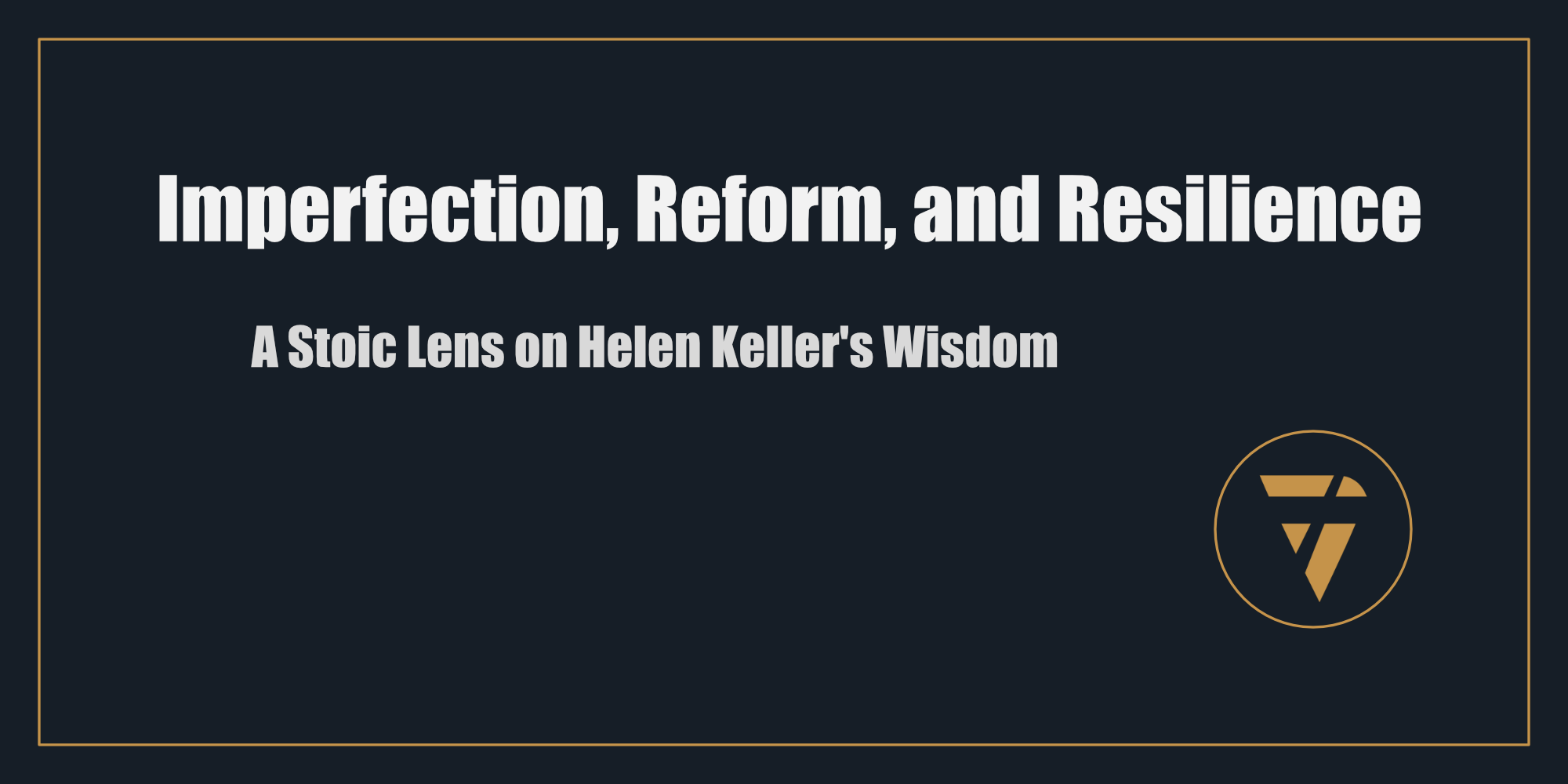Imperfection, Reform, and Resilience
A Stoic Lens on Helen Keller's Wisdom

"What if the key to thriving in an imperfect world isn’t about avoiding flaws, but embracing them as stepping stones for growth? Helen Keller’s timeless insight, 'None of us are perfect. Reform is necessary, but despair is criminal,' offers a profound connection to Stoic philosophy—a guide for modern resilience."
Ryan Holiday posted a quote that made me curious.
I kept reading :)
Why This Matters
Helen Keller’s life was a masterclass in overcoming adversity with grace and determination. Her words resonate deeply with the principles of Stoicism, a philosophy designed to help individuals navigate life’s trials with reason, virtue, and calm. In an age marked by overwhelming challenges and frequent despair, the union of Keller’s insight and Stoic principles offers a roadmap for personal and societal growth.
1. Imperfection is Universal: Accepting Our Nature
Helen Keller’s recognition that “none of us are perfect” mirrors the Stoic acceptance of human fallibility.
- Stoic Perspective: Marcus Aurelius urged us to see imperfection as part of life’s natural order: “Accept the things to which fate binds you.”
- Actionable Takeaway: Reflect daily on the inevitability of mistakes—yours and others’. Shift from blame to understanding. Imperfection isn’t a flaw in the system; it is the system itself.
2. Reform is Necessary: The Call to Virtue
Keller's insistence on reform aligns with Stoicism’s focus on virtuous action as a path to a meaningful life.
- Stoic Perspective: Epictetus emphasized that virtue is found in purposeful action, saying, “First say to yourself what you would be; and then do what you have to do.”
- Actionable Takeaway: Identify one area in your life or community that requires reform. Develop a plan to take small, consistent steps toward improvement. Growth is incremental but cumulative.
3. Despair is Criminal: Mastering Emotions
Keller’s assertion that despair is “criminal” underscores its destructive nature—a sentiment the Stoics would wholeheartedly endorse.
- Stoic Perspective: Seneca wrote, “A man is as miserable as he thinks he is.” Despair paralyzes action and clouds judgment, preventing us from addressing what we can change.
- Actionable Takeaway: Use negative visualization, a Stoic technique, to imagine the worst-case scenario. This practice reduces the power of fear and keeps despair at bay by showing that life continues despite setbacks.
*I’m truly curious about the choice of the word criminal, and what the choice was meant to infer.
4. Control and the Circle of Influence
Keller’s focus on reform and rejection of despair mirrors the Stoic dichotomy of control: focus only on what you can change.
- Stoic Perspective: Epictetus taught, “We cannot control the world, but we can control our response to it.”
- Actionable Takeaway: Make two lists—one for things within your control and another for things outside it. Prioritize your energy on actionable items, letting go of what lies beyond your reach.
Storytime
In her lifetime, Keller faced monumental challenges, being both deaf and blind. Yet, her achievements—graduating college, becoming an activist, and inspiring millions—embody Stoic resilience. Her choice to pursue reform over despair demonstrates the transformative power of focusing on what is possible instead of dwelling on limitations.
Imagine Marcus Aurelius and Helen Keller in dialogue:
- Aurelius: “Adapt yourself to the things your fate has bound you to.”
- Keller: “Yes, and then reform what you can; to despair is to waste your life’s potential.”
Actionable Takeaways
- Accept Imperfection: Begin each day acknowledging that mistakes are natural and opportunities for growth.
- Pursue Reform: Identify one area where small improvements can lead to significant change over time.
- Reject Despair: Practice gratitude and negative visualization to maintain perspective during hardships.
- Focus on Control: Reallocate energy to what you can influence, releasing worry over externalities.
What aspects of your life or mindset could benefit from embracing Keller’s call to reform and rejecting despair? How can you incorporate Stoic practices to navigate life’s imperfections more effectively?
If you’ve found value in this exploration, subscribe for more insights into applying timeless wisdom to modern challenges. Let’s continue the conversation—what’s your approach to reforming the imperfect while rejecting despair? Share your thoughts!
This Substack is reader-supported. To receive new posts and support my work, consider becoming a free or paid subscriber.
This is what I’m working on. Tell me what you think, I enjoy the conversation! Subscribe and follow the work in real time.
Thanks!
B
We plant seeds knowing we won’t see the harvest. Helen Keller and Marcus Aurelius understood this: the fight for change, the call for reform—it’s not about us. It’s about those who come after. Act now, because they’ll inherit what we leave behind.





